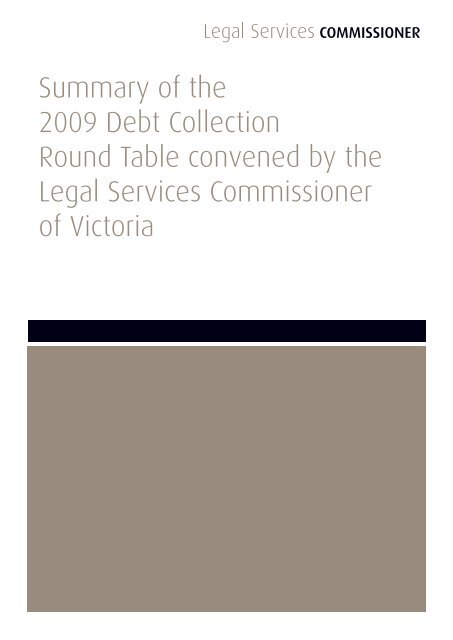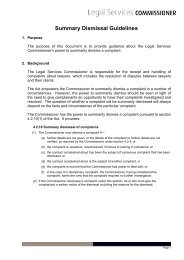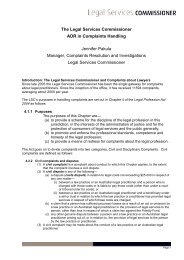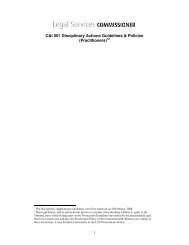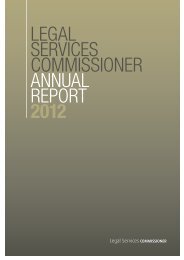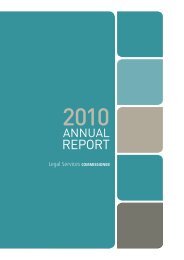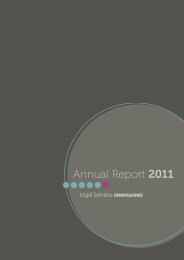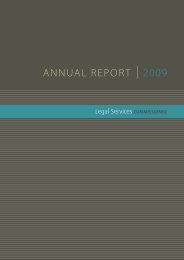Debt Collection Round Table Summary - Legal Services ...
Debt Collection Round Table Summary - Legal Services ...
Debt Collection Round Table Summary - Legal Services ...
You also want an ePaper? Increase the reach of your titles
YUMPU automatically turns print PDFs into web optimized ePapers that Google loves.
<strong>Summary</strong> of the<br />
2009 <strong>Debt</strong> <strong>Collection</strong><br />
<strong>Round</strong> <strong>Table</strong> convened by the<br />
<strong>Legal</strong> <strong>Services</strong> Commissioner<br />
of Victoria
Level 9, 330 Collins Street<br />
Melbourne VIC 3000<br />
DX 185 Melbourne<br />
Phone: 1300 796 344 or 03 9679 8001<br />
Fax: 03 9679 8101<br />
www.lsc.vic.gov.au
CONTENTS<br />
CONTENTS<br />
Acknowledgments Page 1<br />
Introduction Page 2<br />
<strong>Debt</strong> collection as an area of concern Page 2<br />
Findings of complaints Page 2<br />
The round table Page 3<br />
Participants Page 4<br />
Areas of concern identifi ed Page 5<br />
Letters of demand Page 5<br />
Creditors and collection agencies using lawyers’ letterhead Page 6<br />
Pursuing statute-barred debts Page 6<br />
Communication practices with clients and debtors Page 7<br />
Lawyers not using services of community support agencies Page 8<br />
Other issues raised Page 9<br />
Conclusion Page 10<br />
Outcomes Page 10<br />
Other resources available Page 11<br />
Appendix 1 - Statistics on debt collection complaints Page 12<br />
Appendix 2 - Key defi nitions Page 14
ACKNOWLEDGMENTS<br />
The <strong>Legal</strong> <strong>Services</strong> Commissioner of Victoria, Ms Victoria Marles, would like to thank the<br />
representatives from participating organisations who generously gave up their time to participate<br />
in the debt collection round table forum.<br />
The Commissioner acknowledges the invaluable advice and input participants provided on the<br />
issue of complaints and debt collection issues.<br />
Page 1
INTRODUCTION<br />
The <strong>Legal</strong> <strong>Services</strong> Commissioner (the Commissioner) was established on 12 December 2005<br />
to be the single gateway for the receipt and handling of complaints about lawyers in the state of<br />
Victoria. Each year the Commissioner receives approximately 2,000 formal complaints about<br />
lawyers, involving many different areas of law.<br />
Under the <strong>Legal</strong> Profession Act 2004, the Commissioner has a statutory responsibility to educate<br />
both the legal profession and consumers of legal services about relevant issues of concern.<br />
To help identify those issues, the Commissioner regularly monitors complaints data for emerging<br />
trends or changes in the profi le of complaints.<br />
<strong>Debt</strong> collection - a persistent area of concern<br />
One area of law which consistently attracts a high number of complaints is debt collection.<br />
In just over three years from the opening of the offi ce until 31 December 2008, the Commissioner<br />
had received a total of 306 complaints where debt collection was identifi ed as the relevant area of<br />
law.<br />
Complaints may contain one or more allegations against a lawyer. The most common allegations<br />
made about lawyers in the area of debt collection include:<br />
• overcharging a client for debt collection services<br />
• negligence in handling a fi le (for example, failing to undertake work to pursue a debt or<br />
to lodge a form)<br />
• being dishonest and/or misleading (for example providing misleading information in a<br />
letter of demand)<br />
• failing to return calls<br />
• being abusive and/or rude.<br />
Findings of complaints<br />
If, after investigating a complaint, the Commissioner believes that the subject lawyer is guilty of<br />
unsatisfactory professional conduct the Commissioner may, and in the case of professional<br />
misconduct must, bring charges before the Victorian Civil and Administrative Tribunal<br />
(the Tribunal).<br />
Page 2
However, despite the number of complaints received about debt collection, there have been no<br />
complaints where the Commissioner was satisfi ed that there was a reasonable likelihood that the<br />
Tribunal would fi nd the lawyer guilty of professional misconduct, and only nine complaints where<br />
the Commissioner formed the belief that a fi nding of unsatisfactory professional conduct would<br />
be reached.<br />
The <strong>Round</strong> <strong>Table</strong><br />
The Commissioner has discussed the issue of poor debt collection practices with a range of<br />
consumer support agencies. Concerns raised by these agencies highlighted the impact of<br />
ongoing economic instability on consumers and a measurable increase in the number of<br />
consumers who are unable to pay their debts. These agencies also identifi ed a corresponding<br />
increase in the use of debt collection services by creditors.<br />
As lawyers are often involved in the collection of outstanding debts, the Commissioner<br />
recognised that an increase in complaints about debt collection practices has the potential to<br />
lead to an increase in complaints about lawyers.<br />
On Friday 8 May 2009, the Commissioner convened a round table discussion forum involving a<br />
range of organisations which shared concerns about debt collection practices. Representatives<br />
were invited from state and federal regulatory agencies, consumer legal advocacy organisations,<br />
community support agencies and lawyers’ professional associations.<br />
The objective of the round table was to understand the concerns of consumers and regulators,<br />
determine the extent of the involvement of lawyers in poor debt collection practices, and identify<br />
ways of improving those practices for the benefi t of consumers and the legal profession.<br />
The issues raised at the forum and the potential means to address them are detailed in this<br />
document.<br />
Page 3
PARTICIPANTS<br />
The following organisations were represented at the round table forum:<br />
Federal and state government regulators of the debt collection industry<br />
• Australian Competition and Consumer Commission (ACCC)<br />
• Australian Securities and Investments Commission (ASIC)<br />
• Consumer Affairs Victoria (CAV)<br />
Consumer advocate organisations established to provide legal support and information for<br />
consumers<br />
• Victoria <strong>Legal</strong> Aid (VLA)<br />
• Consumer Action Law Centre (CALC)<br />
• Public Interest Law Clearing House (PILCH)<br />
Community support organisations<br />
• Financial and Consumer Rights Council (FCRC)<br />
• Broadmeadows Uniting Care,<br />
• Connections Financial Counselling Service, UnitingCare Australia<br />
<strong>Legal</strong> Profession bodies<br />
• Law Institute of Victoria<br />
• Victorian Bar<br />
• <strong>Legal</strong> Practitioners’ Liability Committee<br />
Page 4
AREAS OF CONCERN IDENTIFIED<br />
During the course of the round table several key areas of concern emerged in the discussions.<br />
Each of these areas is described below.<br />
The Commissioner also identifi ed a number of strategic initiatives aimed at addressing the most<br />
prevalent concerns regarding lawyers’ involvement in debt collection practices. These initiatives,<br />
which focus on providing information to lawyers and consumers, are also detailed below.<br />
Letters of demand<br />
One of the most signifi cant issues raised in the discussions involved the content of the initial letter<br />
of demand sent to a debtor.<br />
Consumer advocates, support groups and the regulators all expressed concern about the<br />
practice of a lawyer including his or her legal costs in the letter of demand, so that the total<br />
claimed includes both the amount of the original debt and legal costs. They contended that this<br />
practice causes confusion among consumers and may mislead consumers into paying more<br />
than they are liable to pay.<br />
Misleading information in a letter from a lawyer may be in breach of the <strong>Legal</strong> Profession Act<br />
2004, and may also be contrary to the Fair Trading Act 1999. However consumers would not<br />
necessarily know the legitimacy of the demand and may end up being intimidated into paying the<br />
full amount.<br />
It emerged that this issue was often raised by consumers with community support organisations.<br />
However the consumers are not necessarily referred on to the <strong>Legal</strong> <strong>Services</strong> Commissioner to<br />
make a formal complaint. The true scope of the problem may therefore be larger than the<br />
Commissioner’s complaint fi gures reveal.<br />
The Commissioner encouraged other organisations to refer their clients on to her offi ce when<br />
letters of demand from lawyers appear to contain misleading directions.<br />
To address this issue, the Commissioner identifi ed an opportunity to support the ACCC, ASIC<br />
and CAV in communicating with both the legal profession and consumers. Information about<br />
acceptable debt collection practices, best practice guidelines for debt collection, lawyers’<br />
conduct rules and relevant legislation will be promoted through the Commissioner’s education<br />
programs and website.<br />
Page 5
Creditors and collection agencies using lawyers’ letterhead<br />
Another concern raised involved the use of a lawyer’s letterhead by creditors and debt recovery<br />
agencies when communicating with a debtor.<br />
In some instances lawyers are engaged by a debt collection agency or creditor to send the letter<br />
of demand to the debtor, when that letter could have been sent by the collection agency or<br />
creditor themselves. In some cases concerns were raised that lawyers were simply providing<br />
their letterheads to debt collection agencies. This practice was seen by many participants as an<br />
attempt to ‘strong-arm’ the recipient of the letter by implying legal involvement and a threat of<br />
further legal action unless the alleged debt was paid.<br />
Often this is the only involvement of the lawyer in the debt collection matter, and no further<br />
instructions are given by the collection agency or creditor. This may confuse the debtor as it is not<br />
clear which organisation is actually handling the debt. Contacting the lawyer may not necessarily<br />
lead the debtor to the collection agency. It was also raised that calls were often referred around<br />
from person to person within fi rms and collection agencies, creating stress and confusion for the<br />
debtor.<br />
Again, the need for increased awareness of and access to acceptable debt collection practice<br />
guidelines was identifi ed.<br />
Pursuing statute-barred debts<br />
Statute-barred debts are those debts which have expired, either through the lapse of a specifi c<br />
timeframe for repayment, or because the debtor has been declared bankrupt.<br />
Regulatory bodies and community support agencies regularly receive reports from consumers<br />
about debt collectors pursuing statute-barred debts. This may indicate either a lack of<br />
understanding on behalf of the collector as to the limitations on collecting those debts or, on the<br />
part of less scrupulous operators, a deliberate ploy to trick the debtor into paying money that<br />
cannot legally be claimed.<br />
It was acknowledged that this issue does not involve large numbers of lawyers. However<br />
concern was expressed that younger lawyers tended to be less aware of the limitations for pursuit<br />
of statute-barred debts, especially after a bankruptcy is discharged.<br />
Page 6
The education of younger lawyers in insolvency was identifi ed as an area where further work<br />
needs to be undertaken.<br />
Further concerns were raised about lawyers who fi le bankruptcy petitions against debtors if the<br />
debtor is not able to repay any money. It was suggested that bankruptcy was seen by some<br />
lawyers as a tool for punishing debtors when repayments could not be made.<br />
This practice arguably results in increased penalties for the debtor for no extra benefi t to the<br />
client. In such scenarios some argue that the lawyer and the trustees in bankruptcy are the only<br />
ones to benefi t from a bankruptcy through the fees they charge.<br />
The Commissioner agreed that there was a need for a greater understanding among the legal<br />
profession of the limitations applied to statute-barred debts and the capacity of seeking debts<br />
after bankruptcy.<br />
Further, information provided to new lawyers through pre-admission programs and to existing<br />
lawyers through providers of continuing professional development courses was identifi ed as<br />
important to address these issues.<br />
Communication practices with clients and debtors<br />
Poor communication is a common complaint made to the Commissioner about lawyers in debt<br />
collection matters. It is also a signifi cant feature of complaints made to other regulators and the<br />
support organisations involved in the round table.<br />
Common issues found by participants included:<br />
• failing to return telephone calls of clients or debtors<br />
• not acknowledging a support agency’s authority to act on behalf of the debtor and<br />
continuing to contact the debtor<br />
• refusing to explore alternative payment options for debtors, preferring to demand the<br />
complete payment in one lump sum as opposed to repayment plans<br />
• not acknowledging queries or clarifi cation of information from debtors, including<br />
information about liability of the debt<br />
• failing to provide further information about the debt when requested.<br />
Page 7
Consumer agencies observed that in many instances the debt collection processes seemed to<br />
have been designed to be extremely diffi cult for the debtor, resulting in many debtors either<br />
running out of time to query or dispute the debt, or simply giving in and paying the amount<br />
claimed.<br />
The ACCC and ASIC guidelines on debt collection practices make it clear that when a debtor<br />
requests further information about a debt the collection agency is required to respond. The debt<br />
cannot be pursued until the query is answered. However by hindering the debtor in his or her<br />
attempts at reaching the correct person handling the matter, the time periods for disputing the<br />
debt are decreased.<br />
The Commissioner acknowledged that all lawyers must be cognisant of ACCC, ASIC and CAV<br />
guidelines in relation to debt collection. Therefore, these guidelines and lawyers’ conduct rules<br />
need to be readily accessible to lawyers.<br />
Lawyers not using services of community support agencies<br />
Concerns were also raised over the practice of lawyers undertaking tasks which did not require<br />
legal expertise, and then billing the client for that work. Often these tasks could be undertaken<br />
free of charge by consumer support organisations. Examples include providing fi nancial<br />
information on bankruptcy and completing bankruptcy forms.<br />
This raises the issue of clients not being aware of community support services available, and<br />
lawyers not advising their clients of the alternatives to legal assistance through specialised<br />
support services, such as fi nancial counselling or specialist health services.<br />
It was acknowledged that there is a general lack of awareness among lawyers about alternative<br />
support services available to clients. The Commissioner recognised the value in providing links<br />
to other regulators and support agencies on the Commissioner’s website, and working with the<br />
professional associations in promoting an increased awareness of community-based support<br />
services.<br />
Page 8
Other issues raised<br />
Other issues were also raised in the discussions which generally related more to debt collection<br />
agencies than to lawyers or law fi rms acting as debt collection agents. The issues include:<br />
• the sale of debts between collection agencies, leading to diffi culties for debtors<br />
seeking information about or paying a debt;<br />
• the issuing of court proceedings in different states from the debtor and the often poor<br />
level of information about rights provided to the debtor; and<br />
• the attempted exploitation of the differences in laws between states to access<br />
laws more benefi cial to the collector (for example, garnishee provisions).<br />
While these issues may not at present involve lawyers in any signifi cant manner, the<br />
Commissioner considered that there was the potential for them to become an increasing concern<br />
for lawyers in the future, especially for law fi rms which practice in more than one state jurisdiction.<br />
Page 9
Conclusion<br />
The <strong>Legal</strong> <strong>Services</strong> Commissioner convened the debt collection round table to develop a greater<br />
understanding of the concerns held by consumers of legal services and debt collection industry<br />
regulators, and to identify the extent to which Victorian lawyers were involved in any practices of<br />
concern.<br />
From the background research and discussions held at the round table, it can be said that the<br />
majority of Victorian lawyers handle debt collection matters with high levels of professionalism.<br />
There is, however, a small number of lawyers that undertake questionable business practices.<br />
The ultimate aim of the <strong>Legal</strong> <strong>Services</strong> Commissioner is to help improve the quality of legal<br />
services for all consumers of legal services. The following initiatives should go someway to<br />
addressing the issues raised at the debt collection round table.<br />
Outcomes<br />
The Commissioner has committed to the following activities raised at the debt collection round<br />
table:<br />
• distribute this document to a number of interested agencies including law associations to help<br />
raise awareness of consumer concerns with the debt collection industry;<br />
• work to improve the level of awareness and understanding of debt collection concerns among<br />
both consumers and the legal profession through developing education material,<br />
providing improved access to relevant information for lawyers, and continuing the dialogue<br />
with all involved parties;<br />
• seek to engage specialist debt recovery law fi rms to highlight the key concerns of consumers<br />
in inter-jurisdictional debt collection matters, and promote the acceptable debt collection<br />
practice guidelines among those fi rms.<br />
Page 10
OTHER RESOURCES AVAILABLE<br />
The ACCC, ASIC and CAV have further resources available for creditors and consumers.<br />
These include:<br />
<strong>Debt</strong> collection guideline: for collectors and creditors<br />
These guidelines were produced jointly by the ACCC and ASIC in 2005 and describe how<br />
relevant provisions of the Trade Practices Act 1974 (Cth) and the Australian Securities and<br />
Investments Commission Act 2001 (Cth) apply to debt collection conduct.<br />
http://www.accc.gov.au/content/index.phtml/itemId/733222<br />
<strong>Debt</strong> collection practices in Australia<br />
Also produced by ACC and ASIC, this document highlights the key issues identifi ed<br />
during an evaluation of debt collection practices undertaken by both agencies in 2008.<br />
It is available from the following Internet address: http://www.accc.gov.au/debtcollection<br />
Guidelines for debt collection: <strong>Debt</strong> collection and the Fair Trading Act 1999<br />
Published by CAV, this document promotes acceptable debt collection practices under Victorian<br />
legislation. The document is available from the CAV website at the following address:<br />
http://www.consumer.vic.gov.au/CA256EB5000644CE/page/Credit+%26+<strong>Debt</strong>OpenDocument<br />
&1=80-Credit+%26+<strong>Debt</strong>~&2=~&3=~<br />
Page 11
APPENDIX 1<br />
Statistics on debt collection complaints<br />
The below information provides an overview of complaints received by the <strong>Legal</strong> <strong>Services</strong><br />
Commissioner between the period of 12 December 2005 and 31 December 2008 which involved<br />
the issue of debt collection.<br />
How many complaints were received about debt collection<br />
• In the three-year period from 12 December 2005 to 31 December 2008 the<br />
Commissioner received 6326 complaints about practitioners.<br />
Of these, 306 (or 5%) were made about lawyers in relation to debt collection.<br />
What allegations do people make in complaints<br />
In the 306 complaints received, the top fi ve allegations made were:<br />
Allegation made<br />
No. times allegation<br />
featured in complaints*<br />
% complaints featuring<br />
the allegation<br />
Professional conduct (including abusiveness,<br />
129 42%<br />
rudeness, dishonesty and/or intimidation)<br />
Costs/Bills – predominantly overcharging 93 30%<br />
Poor service (including negligence and delay 76 25%<br />
Money (including trust monies) 45 15%<br />
Communication (including failure to correspond,<br />
failure to provide information on costs)<br />
44 14%<br />
*The number of allegations far exceeds the total number of complaints made as a complaint will<br />
often include a number of different allegations.<br />
What did people complain about<br />
Disciplinary complaints:<br />
• Practitioner was negligent.<br />
• Practitioner was dishonest and/or misleading.<br />
• Practitioner failed to correspond with complainant.<br />
• Practitioner failed to return calls.<br />
• Practitioner was abusive and/or rude.<br />
Civil complaints:<br />
• Practitioner overcharged for services.<br />
Page 12
Statistics on debt collection complaints (continued)<br />
What were the outcomes of the complaints<br />
249 (81%) of the 306 complaints about debt collection have been closed.<br />
Of the 249 complaints closed:<br />
• 152 complaints were summarily dismissed. Of the complaints summarily dismissed:<br />
- 122 were disciplinary complaints<br />
- 21 were civil complaints.<br />
- 9 were mixed complaints.<br />
• 47 complaints were investigated and no conduct issues were found.<br />
• 16 complaints were withdrawn by the complainants.<br />
• 15 civil complaints were settled.<br />
• 10 complaints resulted in both parties being advised to apply to the Tribunal to<br />
settle the dispute. (Parties are advised to apply to the Tribunal when the<br />
Commissioner is unable to settle the dispute through mediation or other means of<br />
dispute resolution).<br />
• 9 complaints resulted in the Commissioner believing there was a reasonable<br />
likelihood the Tribunal would fi nd the practitioner guilty of unsatisfactory<br />
professional conduct. However due to the circumstances of these matters the<br />
Commissioner opted to use her alternative disciplinary powers to:<br />
- reprimand the practitioner (4)<br />
- issue a caution (1)<br />
- order compensation to be paid without laying charges(1)<br />
- take no further action as the practitioner was otherwise competent (3).<br />
• There were no complaints where the Commissioner believed there was a<br />
reasonable likelihood the Tribunal would fi nd the practitioner guilty of professional<br />
misconduct.<br />
Page 13
APPENDIX 2<br />
Key Definitions<br />
Caution: following an investigation, where the Commissioner forms the view that there is a<br />
reasonable likelihood that the Tribunal would fi nd the practitioner guilty of unsatisfactory<br />
professional conduct the Commissioner may, with the consent of the practitioner, caution the<br />
practitioner.<br />
Civil Complaint: means a civil dispute.<br />
Civil Dispute: means a costs dispute (dispute about legal costs not exceeding $25,000); a<br />
pecuniary loss claim; or any other genuine dispute.<br />
Commissioner: means the <strong>Legal</strong> <strong>Services</strong> Commissioner.<br />
Complainant: means a person who makes a complaint to the Commissioner.<br />
Disciplinary Complaint: means a complaint about the conduct of a practitioner to the extent<br />
that the conduct may amount to unsatisfactory professional conduct or professional misconduct.<br />
Mixed Complaint: means a complaint involving both a disciplinary complaint and a civil<br />
dispute.<br />
No charges laid but compensation paid: following an investigation, where the<br />
Commissioner forms the view that there is a reasonable likelihood that the Tribunal would fi nd<br />
the practitioner guilty of unsatisfactory professional conduct the Commissioner may decide not<br />
to make an application to the Tribunal and may require the practitioner to pay compensation as a<br />
condition of doing so.<br />
No further action: following an investigation, where the Commissioner forms the view that<br />
there is a reasonable likelihood that the Tribunal would fi nd the practitioner guilty of<br />
unsatisfactory professional conduct the Commissioner may take no further action against the<br />
practitioner if satisfi ed that the practitioner is generally competent and diligent and there has been<br />
no substantiated complaint about the conduct of the practitioner within the last fi ve years.<br />
Page 14
Key Definitions (continued)<br />
Professional Misconduct: includes:<br />
• unsatisfactory professional conduct where the conduct involves a substantial or<br />
consistent failure to reach or maintain a reasonable standard of competence; and<br />
• conduct of a practitioner, whether occurring in connection with the practice of law<br />
or otherwise, that would, if established, justify a fi nding that the practitioner is not a<br />
fi t and proper person to engage in legal practice.<br />
Reprimand: following an investigation, where the Commissioner forms the view that there is a<br />
reasonable likelihood that the Tribunal would fi nd the practitioner guilty of unsatisfactory<br />
professional conduct the Commissioner may, with the consent of the practitioner, reprimand the<br />
practitioner.<br />
<strong>Summary</strong> Dismissal: the Act provides that the Commissioner may dismiss a complaint in<br />
certain circumstances. This includes where the complaint is vexatious, misconceived or lacking in<br />
substance.<br />
Unsatisfactory Professional Conduct: includes conduct of a practitioner occurring in<br />
connection with the practice of law that falls short of the standard of competence and diligence<br />
that a member of the public is entitled to expect of a reasonably competent practitioner.<br />
Victorian Civil and Administrative Tribunal (VCAT or the Tribunal): means the judicial<br />
body that hears and determines applications from the <strong>Legal</strong> <strong>Services</strong> Commissioner for a<br />
disciplinary order and applications from the parties to a civil dispute.<br />
Page 15
Page 16


